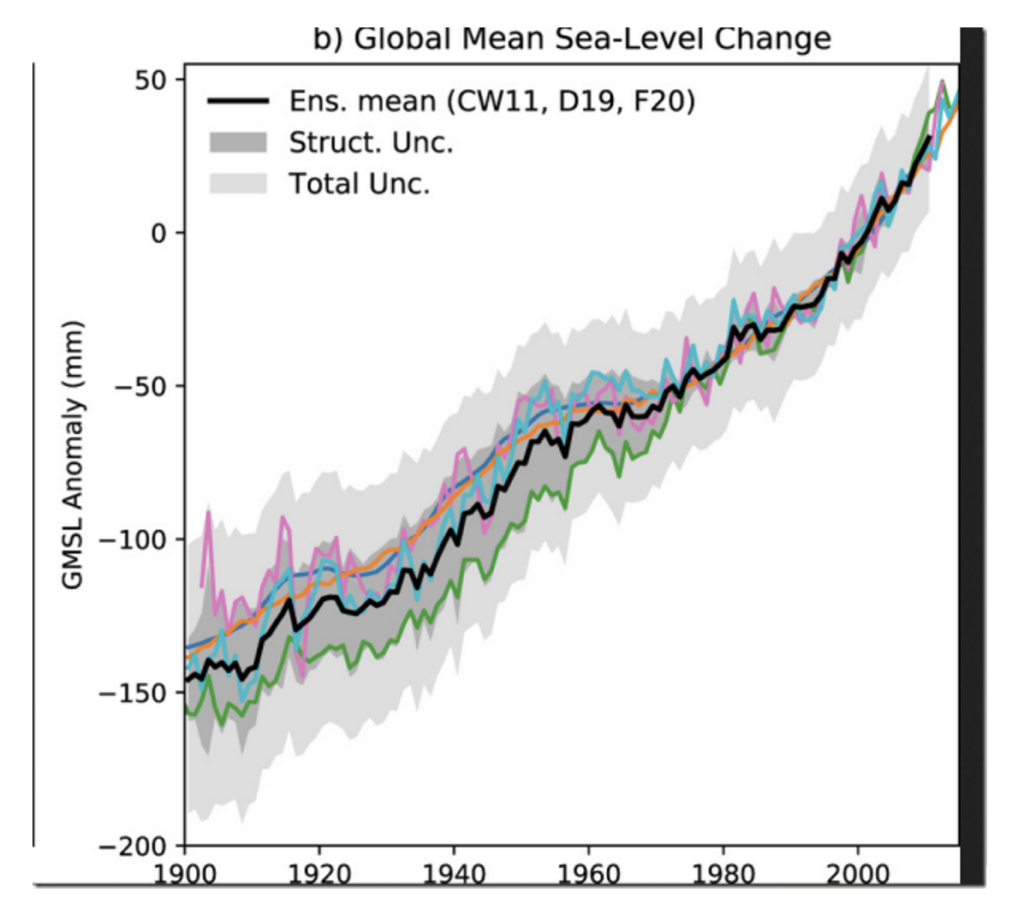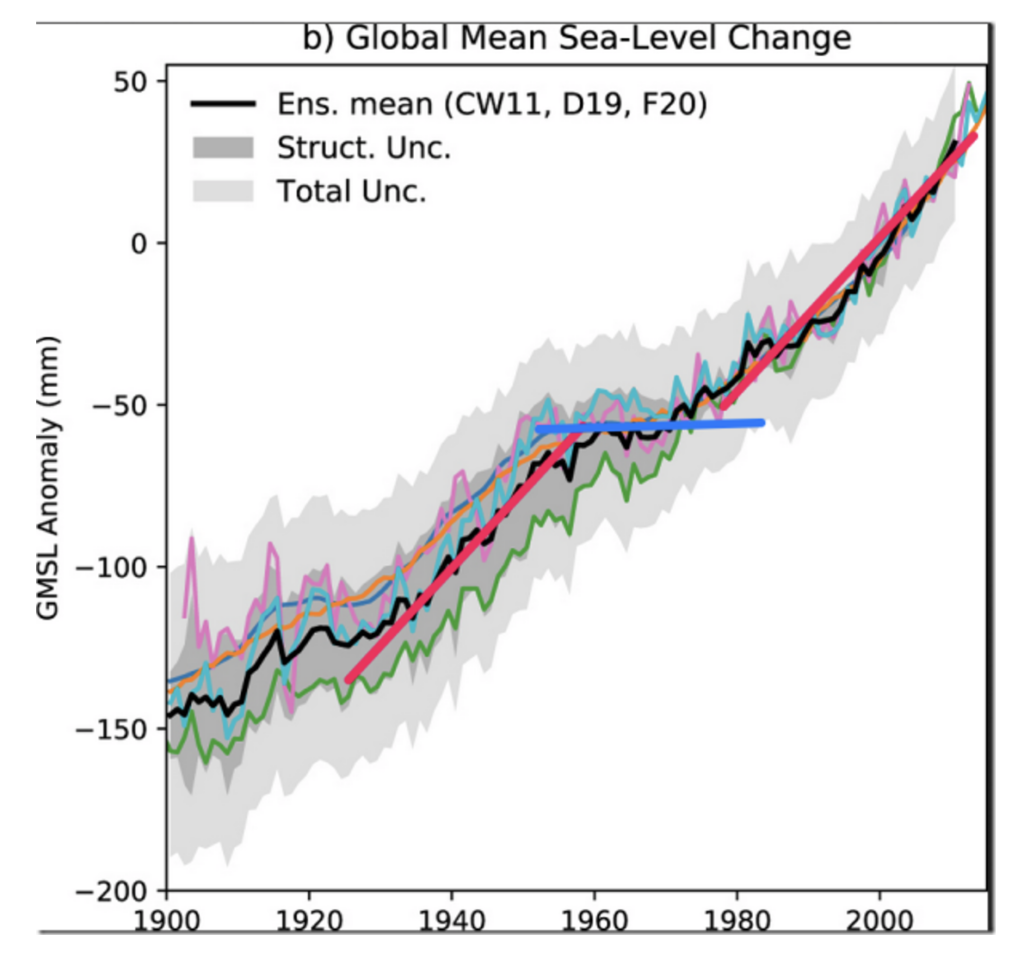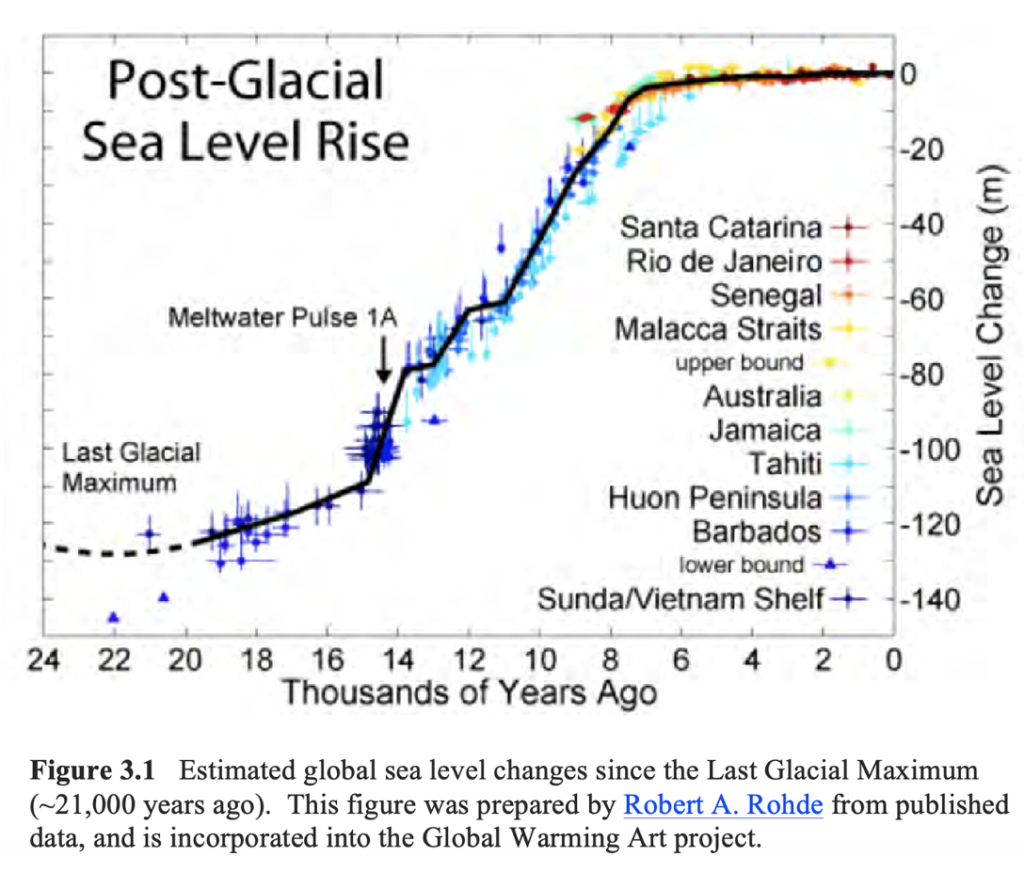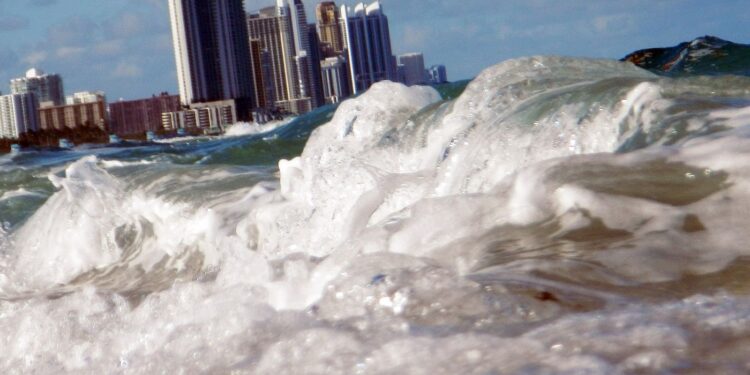Taking its cue from the publication of the Met Office’s annual climate report for 2021, the BBC recently reported that sea levels were rising “much faster” than a century ago. Citizen journalist Paul Homewood did a little digging and came to a different conclusion, noting in the process that, in his view, it was an “improper…. misuse of statistics”. Rates of sea level rise in recent decades are similar to those seen between 1920 and 1960, he reported.
The Met Office notes that since the 1900s, sea levels have risen around the U.K. by between 12-21cms, and this compared with the 15-25cms likely range of global sea level rises. A reader of Homewood’s blog sought further details from the Met Office and was told that according to the “scientific consensus” contained in the IPCC Sixth Assessment Report, the average annual global sea level rise was 1.3mm between 1901 and 1971. This increased to 1.9mm between 1971 and 2006, and further increased to 3.7mm between 2006 and 2018. On the back of the figures as presented, it was claimed that human influence was “very likely the main driver of these increases since at least 1971”.
Homewood said that the Met Office was supplying figures – contained in the IPCC Summary for Policy Makers – that compared the period since 1971 with the period 1901-1971. He noted that this was the “worse sort of cherry picking”. As can be seen below, 1971 was at the end of a significant slow-down in sea level rise.

The graph, linked to by the Met Office, clearly shows the slow-down in the middle. This of course depresses the average rise quoted by the Met Office between 1901 and 1971, while at the same time increasing the trend since 1971.
To make it even clearer, Homewood draws in the lines.

The substantial pause up to the 1970s is clearly seen, and this has been added to the 1901-1970 average. The two red lines shown seem to show that the recent increase in sea levels is similar to that experienced prior to the slow-down in the earlier part of the last century.
The Met Office has been reporting on both U.K. and global sea levels, and Homewood notes that there are similar patterns between them. Tide gauges around the world, including North Shields, New York City, San Francisco and Sydney, Australia, all show rises peaking in the earlier part of the century, and falling away for periods around the middle.
Sea levels are a key battleground in the move to catastrophise any weather or climate related events in the interests of establishing an elitist command-and-control Net Zero society. But accurate measurements are notoriously difficult. Glacial ice melting raises sea levels, but it also allows land to bounce upwards following the lifting of an enormous weight. In a detailed 2019 report on sea levels and climate change, the American climatologist and writer Judith Curry concluded that recent changes in sea levels are “within the range of natural sea level variability over the past several thousand years”. In her view, there was not yet any “convincing evidence” that rising sea levels were associated with human-caused global warming.
In 2016, a group of cartographers compared satellite observations between 1985 and 2015 with accurate nautical maps from earlier centuries and found that on a global level coasts had actually grown since the 1980s. Overall, coasts gained 13,565 Km2 more than they lost to the seas. Furthermore, it was found that none of the world’s islands larger than 10 hectares had decreased in size. This of course might explain why the Maldives is still building resorts and airports close to the ocean.

As the last ice age released its grip, sea levels rose by over 120 metres. On the scale of measurement needed to show this dramatic melt, the change over the last few thousand years appears as an almost straight line. It can be argued that the last time rising sea levels were a major threat to humanity was around 8,000 years ago.
Meanwhile, BBC climate science reporting seems to be getting more emotional and wedded to predictions of Armageddon with every passing day. “Catastrophic climate change outcomes, including human extinction, are not being taken seriously enough by scientists,” a new study is reported to have said. More studies are needed on the “possibility of human extinction”, blares the headline. The world needs to start preparing for the possibility of the ‘climate endgame’, claims the new study. The lead author of this green agitprop is Dr. Luke Kemp, a Cambridge economist with a doctorate in international relations.
Needless to say, no attempt is made to question any of these barking green assumptions, but the article ends with the editorial suggestion that the plea for serious study of extreme scenarios will chime with many younger climate activists. It was vital that there was research into this, said Laura Young, a 25-year old climate activist. “This is because without the full truth, and all of the potential impacts, we won’t make the informed choices we need, and we won’t be driving climate action with enough pressure”, she explained.
No doubt the BBC can be relied upon to supply a ‘full truth’ narrative that avoids any mention that global warming ran out of steam 20 years ago, rising sea levels are not an existential threat, humans are not going extinct any time soon, hurricanes are not getting worse, the world is not being consumed by wildfires, the coral reefs in Australia are currently growing like topsy, and deaths from weather-related events have fallen by 95% over the last 100 years.
Chris Morrison is the Daily Sceptic’s Environment Editor












To join in with the discussion please make a donation to The Daily Sceptic.
Profanity and abuse will be removed and may lead to a permanent ban.
“humans are not going extinct any time soon,”
Sorry Chris but Bill, Klaus, Bliar, Carnage and Charlie hug a tree Windsor have a very different view on human extinction.
Regarding the BBC ‘study’: So-called computer models of implausible catastrophes have been such a runaway success in the area of Corona policies that the climate changers – largely the same group of people – are obviously itching to try that again. They expect that this will very much resonate with children in their teens who can be bombarded with this kind of horror fiction while still at school (and hence, forced to listen) and who are young enough that they don’t really remember that The world will be going under in at most x years, x < 15
has been a staple of communist agitation since the 1970s.
There is only one sea-level, fluctuating by tides and what-have-you, but the sea can’t rise 10metres here and not everywhere else..? If that did happen, I’d be tempted to look at plate tectonics and land sinking, not sea’s rising.
Also, where is all the extra water coming from. The seas constitute c.335 million square kilometers, so to raise the sealevel 1metre, you need an extra 335 billion litres of water. That would be a cube with sides close to 70,000km.
Please feel free to correct my calculation and assumptions. I’ve done it pretty much in my head.
A Net Zero Bonfire
https://www.youtube.com/watch?v=CM1K7h1CJp0
Wind Turbine Catches Fire In Hull
WE GOT A PROBLEM
Yellow Boards By The Road BUILD BACK FREEDOM
Thursday 4th August 11am to 12pm
Yellow Boards
Junction A321 Wargrave Road &
A4 New Bath Road
Twyford RG10 9PN
Stand in the Park Sundays 10.30am to 11.30am – make friends & keep sane
Wokingham
Howard Palmer Gardens Sturges Rd RG40 2HD
Bracknell
South Hill Park, Rear Lawn, RG12 7PA
Telegram http://t.me/astandintheparkbracknell